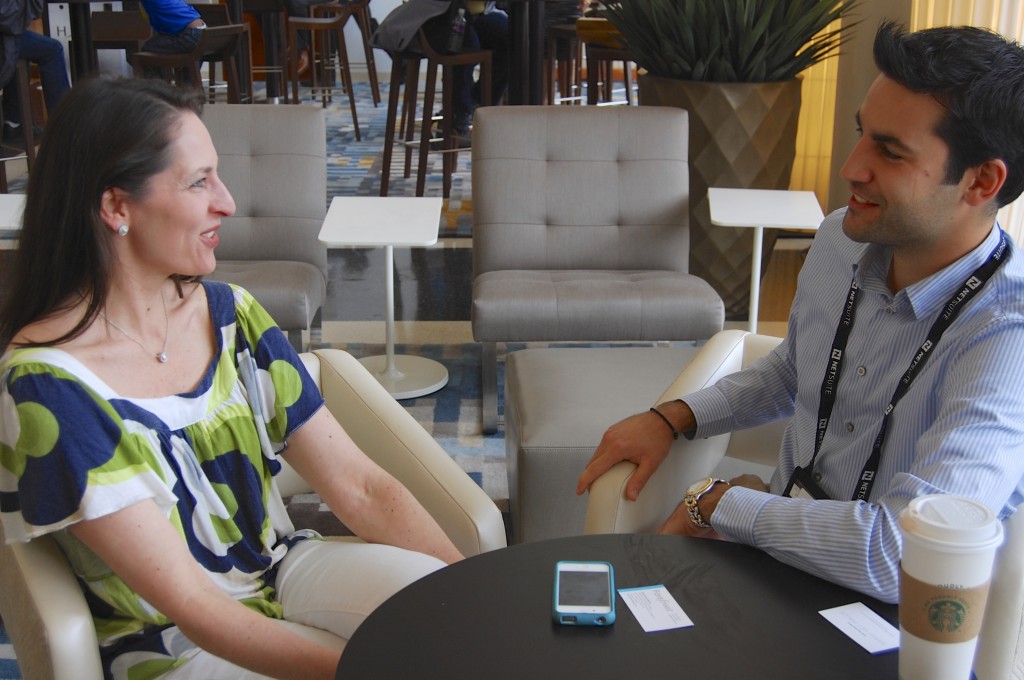In part 2, Indochino COO, Sarah Veit Wallis explains how setting defined guidelines is good for the future of the company, and something she follows as well
By George Bozonelos and Jaclyn Crawford
Editor’s Note: Sarah Veit Wallis spoke yesterday of challenges that she faced in the first few months at a new position. Today, she continues– with a glimpse of what could be in her future.
Forefront Magazine: You’ve been at Indochino for three and a half months, can you tell me about that and the playbook you’ve been trying to follow during this time?

Sarah Veit Wallis: I think the most challenging thing I faced over the last three and a half months is finding that right balance between absorbing and learning and getting to know people, getting to know history and context. At the same time, recognizing that this is an incredibly fast-growing business that’s evolving. We don’t have time for me to learn everything that I need to know to make all perfect decisions. Finding that right balance around sort of where are their places where there are things that are pretty straight forward that we need to act on now and whereas some other areas where I need to learn a little bit more before making any big decisions. That’s to filter the things through is sort of where do I need to act and where do I need a little bit more information before making a decision.
FM: That’s a very delicate balance.
SVW:If you get it wrong, you’ve got some big consequences in either direction.
FM: Especially when inheriting a team and that culture that’s already existing at the company, you want to drive innovation and drive things forward. At the same time, you don’t necessarily want to rock the boat. People respond differently to different changes in their environment.
Sarah: I actually wouldn’t say that my intention is to not rock the boat. I do think that it’s important for folks who come in at a senior level who have experience and who also have fresh eyes to see the organization. There are times where it is important to rock the boat and shake people up. I think you learn a lot about people when you push a little bit. The key is to not push people over the edge of the cliff but just push a little bit and get a sense of how they react to some of the changes in the direction that you need to go.
FM: I second that. There’s no real book on it. You just have to train. Every environment is different. Now you’re wearing several hats–you have the COO hat and also finance and I’m assuming marketing–Tell me about that and your plans–how you’re meshing all of this together from an operational standpoint
Sarah: I think there’s 2 things. I mean, it’s human nature to have an us and them. If you think about college sports, you root for your team. Then, if your team’s out of it, you then start rooting for your conference. I don’t know if you guys do but for me. As long as Stanford’s in it, I’m all about Stanford. I am anti CAL and UCLA and Oregon etcetera. As soon as Stanford’s no longer in the running, I’m all about the PAC-10. The “us and them” will evolve. There’s just this human nature to always have that. I think it’s important to always make sure that within a company, you’re clear on who the us is and who the them is and that everyone in this company is part of us and that it’s the competition that’s them. As opposed to allowing any sort of … I think sometimes I’ve seen teams within companies be encouraged to be teams, sometimes, an expected consequence of that, they start to define us too narrowly and them as another team. I want to avoid that.
I think one of the tactics that I’ve taken to try to mitigate that is defining teams as in as many ways as you can. As an example, I just gathered all of our managers together. We have manager meeting with our leadership to the next level, below the C -level and all of our team leads. We talked about a number of things. One of the things that we talked about at the end was what we wanted to get out of the meeting. I said what I wanted to get out of the meeting was for all of the managers to actually start to view themselves as a team. There’s the company team. There’s the individual areas that they have the folks who report to them, who they consider their team. This group of managers needs to be another team where they’re all working together to achieve what they need to achieve. They need to get to know one another. They’ve all had different experiences. They can bring different things to the table. If they know one another, they’ll know like, oh you know I bet so and so dealt with something like this with their previous company or saw something like this in one of their previous experiences. I’m going to go talk to them and see what their point of view is on this thing that I’m struggling with.
FM: Another element that some companies have a hard time with is aligning everyone. This is especially true for a high growth company– there’s a lot of changes going on. There’s a lot of people being added to the groups at any given time. Keeping that going is a challenge. Thinking far out here– a year, two years, five years–what are some goals that you have for yourself within the company and also for the company as a whole? And how do you see your role changing?
Sarah: For the company looking a year, two or three years out, we want to be known as the company that dresses men better. Now, at this point that’s through custom, personalized, tailored, tends to be more dress shirts and suits. That certainly is our focus. Our focus has been getting great at that. We really believe that we can be one of, if not, the leading men’s companies. We really want to be known like when guys think of success, we want them to be thinking of Indochino. In terms of me personally in kind of how I see my role changing, I think right now, we’re going through that period of rapid growth. We anticipate that that will continue for the next several years. There’s still a ton of opportunity. The menswear space is massive. There’s a lot of room to continue and accelerate the growth. At the same time, the company is expanding very rapidly and going through a lot of the key transformational periods of coming close to 150 employees. We have just moved into new physical space which is much larger. It used to be a much smaller office where everybody tripped over everyone else. I had a meeting with our Chief Creative Officer in the supply closet. We didn’t have anywhere to meet in. We just stood in the supply closet.
FM: It’s more of–how do you promote yourself into something else?

Sarah: I think that’s exactly … You do have to be careful about what you’re trying to achieve. There’s what you’re trying to achieve then there’s no … I gave them this drawback on my own experience when I was younger. I didn’t know things. We have a lot of young folks work in the office. I have to acknowledge that as obvious as things are to me now because I’ve experienced things over the course of my career. I’ve seen how business has changed and evolved. I’ve seen people change and evolve, that a lot of people haven’t seen that. You have to recognize that some things that are not scary to me are scary to them. I think that’s one of the things that I’ve been very careful about is to make sure that we’re talking about expectations but to not make people afraid that we’re all of a sudden raising the bar on them by 50x. They’re never going to be able to achieve it.
FM: Having people understand the reasons of what needs to get done is sometimes harder than the actual action that needs to get done. That’s the people aspect of the job. Conveying the intentions, or spirit, behind the decision.
Sarah: To be honest, nothing speaks more loudly than success. If you talk a lot about what you’re going to do, it changes the dynamic of you doing it both in terms of the expectations that are created. Also because sometimes things don’t always go the way you expect. It takes a little longer, whatever. We put in place, one of the first things that we did when I got there was we formalized a traveling expense policy. It was one of those things where we could’ve talked about the fact that it’s coming or we can just do it. We just did it. For some folks, it was much more stringent than it had in the past. They didn’t love that. For the vast majority of folks, it was sort of the guidance that they needed. In the past, it hadn’t been really super clear.
FM: Being defined is better than having unspoken rules. You don’t want people always asking “how does this work?” It’s like having a manual.
Sarah: Right. I think if we had said we’re going to be working on the following expense policy, that it’s going to make everything really clear, I think a lot of people would’ve been like, “Oh, well what did that mean? Are you going to be taking away things?” There would have been anticipation around it. Whereas instead, we just did it. We knew it was the right thing. We laid out … The first couple of sentences clearly says that our goal is to recognize that you’re away from your home and your family. We want you to travel comfortably and safely. At the same time, recognize that we are a start-up. We’re not out to treat you to the finest meal that whatever city you’re traveling has to offer. We clearly stated, that’s the goal. We aligned everything. Every decision that we make could tie back to that. Things like, we travel coach- I fly coach to Shanghai.
FM: It’s great that you point out that you personally also fly coach as well. This is a policy that applies to everyone and is not just a lower level employee type of policy. You’ve heard classic cases of the executives getting perks at places. That creates animosity and resentment. The fact that you’re also personally doing it shows you practice what you preach.
SWV: I do think that sometimes different benefits are appropriate for different people. As long as you can defend them and clearly communicate. If I had to go to Shanghai every month for a week or 10 days or whatever it is. I’m just in the cusp of that, in every six weeks so it’s fine. I actually might stand up and say, but I would say it to my CEO. I would also feel, like it’s having an impact on my ability to do my job. I’m exhausted all the time. It’s really grueling.
As long as I feel comfortable sharing that … Jeff Pfeffer was my HR professor at Stanford. He has what I call the jolly happy people school of HR. He was sharing with us that in theory, companies should be willing to publish salaries. It’s an interesting concept. What he said was you should be able to justify to every individual why their compensation is what it is relative to others and relative to the market. If you can’t do that, then there’s something wrong. I don’t think there are any companies that I know of who are actually doing that. It’s an interesting concept. One of my flaws is I don’t do anything unless I feel like I could explain it to everyone.
 Sarah Veit Wallis is the COO at Indochino. Read more about her here.
Sarah Veit Wallis is the COO at Indochino. Read more about her here.
George Bozonelos is the CEO and Publisher of Forefront Magazine. Read his bio here.
Jaclyn Crawford is the Assignment Editor at Forefront Magazine. Read her bio here.


